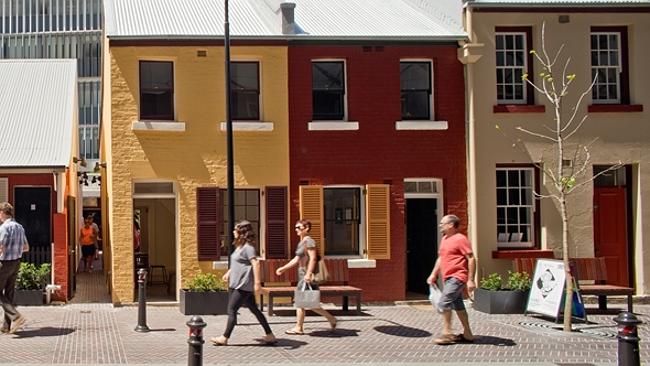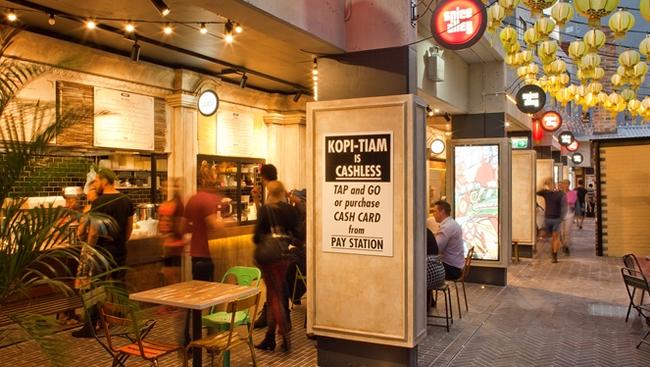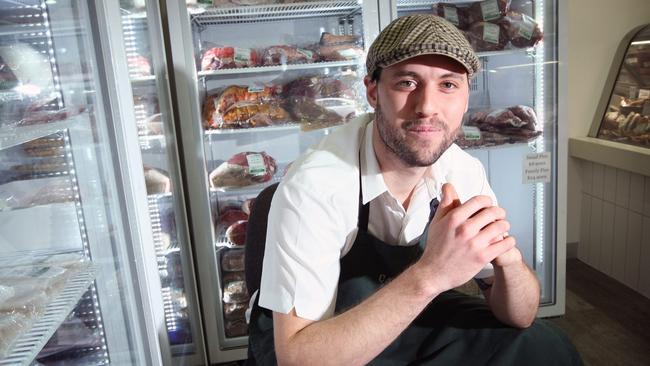Sydney street could be the first in Australia to go cashless
IT LOOKS like your average terrace. But this Sydney thoroughfare could be on the verge of doing something no other street has done.

IT LOOKS like any inner city Australian street; a pub on the corner, a row of old terraces, even somewhere you can grab a Thai curry. The laneway, on the fringe of Sydney’s CBD, might be modest but what is happening here could dramatically affect the money we all have in our pockets.
Because Kensington St, in Chippendale, could be on the verge of a retail revolution — permanently banning payments in notes and coins by going fully cashless.
Australia is already a world leader in embracing new ways to pay.
And with innovative technologies, such as Apple Pay just around the corner, it’s likely more people will find retailers turning their nose up at notes.
Cash began to get the axe on Kensington St in August with the opening of a new strip of eateries. As customers headed to Kopi-Tiam Spice Alley, which has turned a row of former back gardens into an Asian style hawker food market, they were confronted with signs declaring only tap and go cards would be accepted.

Part of the new Central Park development, CEO of Kensington St, Marcus Chang, told news.com.au the reception had been so positive he was considering expanding the ban on bills to other outlets on the street as they opened.
“No one has said ‘I bloody hate it’ and walked out, in fact they said I’ll just use my pay wave because that’s the future.”
In 2007, 69 per cent of payments in Australia were in cash. By 2013, that had plummeted to just 47 per cent with cards nipping at the heels of notes and coins at 43 per cent, according to data from international market research agency Colmar Brunton.
CEO of the Australian Payments Clearing Association, Chris Hamilton, said the use of cash was going down by about five per cent each year while non-cash payments were on the rise by about nine per cent annually.
“In value terms cash is a very small proportion of payment activity but because lots of very small transactions occur using cash it would still be just about the most common form of payment.”
Swinburne University payments expert, Professor Steve Worthington, said people were initially wary of tip-and-go due to the potential for fraud.
“But that didn’t happen so it’s given people more confidence and there’s also been great growth in terminals that accept cards.”
“It’s now far more used for low value payments. I just went to the supermarket to buy milk and I paid contactless, so it’s low value as well as high need,” he said.
Mr Chang said putting a kibosh on cash sped up queues on Kensington St, stopped sticky-fingered serving staff from having to handle cash, and aided administration.
“There’s no floats, there’s no cashing out and because all our purchases are low, it’s bang and off you go.”
One small booth is available for customers who insist on using cash but even there they have to purchase a gift card to buy food. While the pub on the corner has no immediate plans to go cash free, Mr Chang said he wouldn’t rule it out of the rest of the street.
“It’s worked especially well in food and beverage,” he said, “It’s an option, we could be the first cashless street.”
Cannings, a chain of free range butchers in Melbourne, was one of Australia’s first retailers to snub traditional payment methods. Like Mr Chang, owner Sam Canning saw the benefit in staff not having to handle cash. And with around 80 per cent of customers using cards anyway, it made sense, he told SmartCompany.

Macquarie University’s network of clinics, where budding student chiropractors can test their skills on patients, has also gone fully electronic.
The university’s Rosemary Giuriato, said axing cash helped save costs and reduced the risk of theft. “A clinic that accepts cash always needs to have cash available for the purpose of giving change and security around this money is an additional burden.”
Last year in Manchester, UK, an attempt to make a whole street go cashless for the day went awry when some retailers refused to take part in the trial. But with one company letting out all of the outlets on Sydney’s Kensington St, that’s unlikely to be as big an issue.
According to the World Payments Report, the Finns are the most enthusiastic adopters of contactless payments. In Denmark, nearly a third of all citizens choose to pay through the mobile app of just one bank while there are plans to make the entire country cash free.
Australians aren’t far behind having the fourth highest rate of contactless transactions. Here, the big banks are working on the creation of a ‘new payments platform’ that, from 2017, will make low cost digital payments even quicker and could hasten the demise of cash.
Mr Hamilton said the next wave of payment technology would be through far greater use of mobile phones. “There will be an app on your phone that will be a wallet full of cards and you will be able to use a card on the screen rather than pulling out the plastic in your wallet.”
Prof Worthington said Apple Pay, which was launched in 2014 the USA last year and is due in Australia by the end of the year, was just one of the many new methods people will buy products with in future. “It will take some time for people to get comfortable with it but it’s as just another form of payment. We started off with conch shells and then coins and Apple Pay will be another one.”
So will we one day go completely cash free?
During the inevitable IT failures, when payment terminals and ATMs go down, notes and coins and, besides he said, ‘cash in hand’ was never likely to be replaced by ‘tap-and-go in hand’.
“Cash is on the way down but it’s not on the way out,” Prof Worthington said. “Cash is a bit like vinyl, it will always be around for those that appreciate it.”




